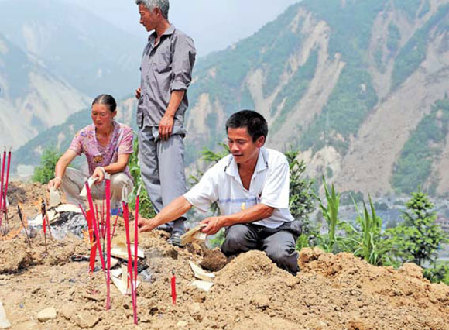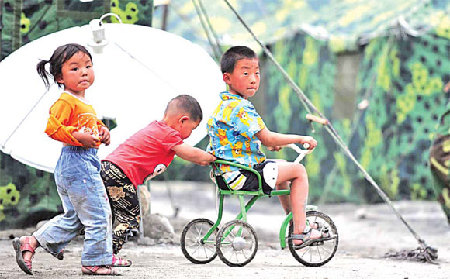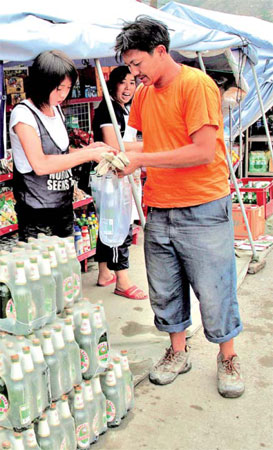
People pay their respects to family members who died in the quake at a hilltop in Yingxiu. (Xinhua photo)

A medical team in Yingxiu checks on quake victims on June 12. (Xinhua photo)

Children play outside quake relief headquarters in Yingxiu. (Xinhua photo)
The mission of his 90-strong company then: to search for survivors among the ruins and save them.
A month later, the 27-year-old said the soldiers are now tasked with disaster relief and reconstruction.
"Our army is still in Yingxiu," Liu said.
"But now we focus on helping quake victims build tents and makeshift homes."
Hardly any survivors are expected to be found as more than a month has passed since the quake struck, Liu said.
"But if any bodies are discovered, we will be responsible for treating them," he added.
Liu's mission yesterday alone was to deal with six bodies that were found beneath a landslide 5 km to the north of Yingxiu.

A man buys beer at a tent that serves as a grocery store in Yingxiu.
Together with 20 "Iron Army" soldiers, Liu trekked to the west bank of the Minjiang River that runs through the town. The troops took a boat to the east bank where the bodies were found.
Donning white, anti-infection coats, Liu's team arrived at the site at about 11 pm. Apart from six intact bodies, the soldiers found only the bones of six people.
Liu and his colleagues sterilized the bones and placed them in bags before burying the remains.
The soldiers who took part in the recovery mission were also disinfected. Standing in a row on the east bank of the Minjiang, a soldier sprayed disinfectant onto the hands and feet of the troops. They shed their white attire and burned those immediately. The site was finally cordoned off from the public.
Dealing with such daunting work for the past weeks, Liu has found it necessary to take his mind off the disaster.
"My wife told me she was pregnant earlier this month," he said.
"I am so happy, to be a father for the first time."
His surrounding colleagues were all smiles for the father-to-be.
"I was able to contact my wife, who is in Luoyang, Henan province, only once a week at the most before communication was cut off totally after I arrived here," Liu said.
"But now, I am able to call her every day. I am prepared to be stationed here for the long term, for reconstruction."
The damaged communications network was a major problem for Liu and quake victims. Most quake victims evacuated Yingxiu on foot to Chengdu, the provincial capital of Sichuan, as they felt that the risks were a better option to hunger and waiting for death in the isolated town.